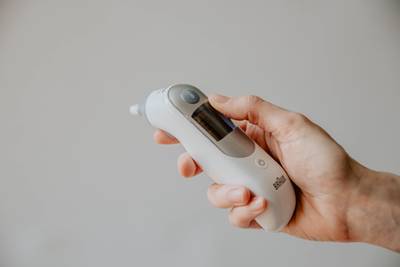![Healthy Matters]() Pharmacist Tips | Dosages | Side effects
Pharmacist Tips | Dosages | Side effects![Healthy Matters]() Nutritionist Tips | Facts | Precautions
Nutritionist Tips | Facts | Precautions![Healthy Matters]() Practitioner Tips | Dosages | Side effects
Practitioner Tips | Dosages | Side effects![Healthy Matters]()
![Healthy Matters]()

Feeling Dizzy? Why Does Dizziness Happen and What To Do?
3 min read

It is common to feel dizzy or unbalanced at times. You can get it from spinning around or from getting up too quickly. In some cases, dizziness can be a symptom of something much more serious. Let's learn more about dizziness 😵......
What is dizziness?
Dizziness is a feeling of lightheadedness that feels like you may be about to faint. It also brings loss of balance, difficulty walking straight and disorientation. It is usually mild and gets better without treatment. However, dizziness increases the risk of falling and subsequent injuries.
You may also come across the word vertigo which is often associated with dizziness. They are similar but vertigo refers more specifically to seeing things spinning or moving around you.

What causes dizziness?
Dizziness can be caused by many different reasons. Common causes that might lead to dizziness include:
- Heart-related problems: e.g. heart attack, heart muscle disease, irregular heartbeat (arrhythmia) and atrial fibrillation. They affect the heart’s ability to pump blood out and reduce blood flow to the brain.
- Blood pressure issues: e.g. poor blood circulation and a drop in blood pressure caused by severe bleeding, dehydration or standing up suddenly. They cause lightheadedness when the body lacks blood, especially in the brain.
- Inner ear problems: e.g. vertigo including benign paroxysmal positional vertigo, Meniere’s disease, disequilibrium and ear infections. Ears regulate equilibrium and balance, dizziness could be an indication of such a problem in that area.
- Brain conditions: e.g. stroke, brain tumor, migraines, multiple sclerosis, dementia and other brain disorders.
- Psychiatric disorders: e.g. stress, anxiety, panic attacks and depression.
- Medications: dizziness is often a side effect of many medications: e.g. antihypertensives, anticonvulsants, antidepressants, sedatives, antibiotics and pain killers.
Other possible causes of dizziness:
- Anemia or lack of iron due to reduced ability of red blood cells to carry oxygen.
- Low blood sugar, e.g. in people with diabetes or during fasts.
- Pregnancy and menstruation as a result of hormonal changes.
- Excessive activities increase sweating and fluid loss.
- Viral diseases, e.g. common cold, flu and influenza.
- Motion sickness.
- Drinking too much alcohol.
- Allergies.
- Carbon monoxide poisoning.
- Electrolyte and hormonal imbalances.
When to see a doctor?
You must see a doctor if you:
- feel dizzy frequently.
- have worsening symptoms.
- still feel lightheaded after resting and having fluids for 2 hours.
- have difficulty breathing.
- experience chest pain.
- cannot see things clearly (blurred or double vision).
- have numbness or weakness in the face, arms or legs.
- have trouble walking.
- pass out.
- have altered consciousness.
- have difficulty speaking or hearing.
- get a fever higher than 38ºC (100.4ºF).
- keep vomiting.
- develop a new or severe headache.
How is dizziness treated?
Treatment for dizziness depends on its underlying cause. You need to see a doctor if it persists and some tests may need to be carried out to exclude any underlying medical condition.
Treatment is not always necessary, particularly if it only lasts for a few seconds to minutes. Chronic dizziness will go away when the underlying conditions are managed, such as:
- Meniere’s disease: a low-salt diet and diuretics (e.g. hydrochlorothiazide) to drain fluid accumulated in Meniere’s disease.
- Migraines: pain relief medications such as paracetamol, ibuprofen, naproxen and aspirin.
- Orthostatic hypotension: e.g. fludrocortisone or pseudoephedrine to increase blood pressure.
- Anxiety: e.g. citalopram and fluoxetine.
Your doctor may prescribe you antihistamines (e.g. dimenhydrinate and cetirizine) and anticholinergics (e.g. benztropine mesylate) if nausea occurs as well. Benzodiazepines (e.g. diazepam and lorazepam) are effective in controlling spinning sensation.
You may also opt for canalith repositioning if you have benign paroxysmal positional vertigo. It can be done by your doctor or a therapist. Another therapy is called balance rehabilitation in which you will learn some exercises to help your body adjust to changes in motion.
Talk to your doctor or pharmacist if your dizziness is caused by medications.
What can you do to feel better from dizziness?
Below is a list of do’s and don'ts if you are feeling dizzy:
- Sit down or lie down until you no longer feel dizzy, then stand up slowly to avoid losing your balance and falling.
- Drink plenty of fluids, especially water.
- Rest in a cool place.
- Walk with a cane or hold onto handrails if necessary or possible.
- Do not bend down suddenly.
- Do not get up suddenly after sitting or lying down for prolonged periods of time.
- Do not drive, use machinery, lift something heavy or do anything else that could be dangerous.
Prevention of dizziness
- Avoid standing up too quickly and suddenly.
- Drink plenty of fluids, particularly during hot weather or after sweaty activities.
- Eat a healthy and balanced diet regularly.
- Avoid foods and drinks that contain too much caffeine, alcohol and salt.
- Do not smoke.
- Get enough sleep every day.
- Stretch your legs after standing for a long time to help pump blood back to the heart.
Dr. Lily Wong 黃淑婷醫生 is a family practitioner at The London Medical Clinic. She is both a registered general practitioner and a pharmacist in the UK and HK. Having lived and worked as a general practitioner for many years in busy practices in London, she relocated to Hong Kong with her family a few years ago. Dr. Wong has also been appointed Honorary Assistant Professor in the Department of Family Medicine at Hong Kong University, for her teaching of medical students.
This article was independently written by Healthy Matters. It is informative only and not intended to be a substitute for professional medical advice, diagnosis or treatment. It should not be relied upon for specific medical advice.

Your health resource, made in Hong Kong
Healthy Matters is Hong Kong’s leading health resource. Our mission is to help you make better health decisions and take control of your health.
Our team of experts is committed to producing reliable health content that is accurate, engaging and relevant, to cover your health & wellness journey from prevention to treatment.
Whether you are looking for trusted information on health conditions, wellbeing or looking for the right doctor or service in Hong Kong, we’re here to help!
Your health matters. Begin your health journey with Healthy Matters today!



































